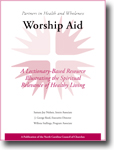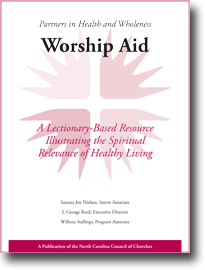A Lectionary-Based Resource Illustrating the Spiritual Relevance of Healthy Living
Introduction
By J. George Reed, Executive Director, NC Council of Churches
Welcome to our worship resources for Partners in Health and Wholeness (PHW). PHW is an ambitious program of the North Carolina Council of Churches designed to help people of faith to see health — their own health — as an issue of faith and to take action that will lead to healthier and more abundant living.
The nationwide obesity epidemic which especially affects NC has serious consequences for both adults and children. Some of the serious health conditions that too often result are diabetes, heart disease, stroke, some cancers, and high blood pressure. While there are a variety of reasons for this epidemic, some of which we have no control over, two of the important causes are our diets and our lack of physical activity— two things over which we do have some control.
Other factors also affect our health: smoking and being exposed to secondhand smoke, inadequate access to health care resources, avoidable falls and other accidents, substance abuse, infectious diseases, environmental exposures, and mental health.
We hope that North Carolina‘s clergy and other faith leaders will promote and model healthier lifestyles for all of us.
Because this is a worship resource and because we are people who base worship on sacred scriptures, it has been important to us to ground this work in the word of God. When I was growing up, passages from I Corinthians (our bodies as God‘s temple) were the basis for saying that Christians shouldn‘t consume alcoholic beverages (I was a Southern Baptist at the time) or smoke tobacco (as you can tell, I was NOT in North Carolina!). Today, I believe that treating my body as God‘s temple speaks to putting healthier foods into it, not putting in harmful substances, and giving it the exercise that health professionals tell us we should get.
But we looked at great length for the biblical passages which command us to eat less saturated fat, go to the gym to work out each day, and engage in other health-conscious activities. We tried out several passages in looking for scriptural support for healthier lifestyles. We read what others have written. On more than one occasion, Samara Joy Nielsen, a Duke Divinity School student interning with us, raised the issue of eisegesis, pointing out (rightly, I might add) that I was trying to make a passage say something today that it wasn‘t really intended to say.
While we have ended up with passages which do promote health and wholeness, we have given up on being able to proof-text healthy diets and physical activity. And we‘ve realized that there are at least three reasons why we can‘t find those “Thou shalts” and “Thou shalt nots”:
- People in agrarian societies farming with little or no mechanization don‘t need to be told to get their exercise. Several biblical passages speak to the labor involved in farming. Any of us who grew up on farms know how hard that work is. And the few of us who still work the land more or less by hand do not suffer from too little activity and do not need to go to the gym. It‘s people like me, and probably like many of you reading these words, who spend the whole day behind a desk, in a car, sitting at conference tables – we‘re the ones who desperately need the message of physical activity.
- People who are relatively poor and live in rural areas — then and now — don‘t have access to the rich foods which often compromise our health. So, while there are occasional biblical references to rich foods, most people in biblical times would not have had that as an option, eating instead a subsistence diet of fruits, vegetables, grains, and meats that they produced themselves. Salt and sugar were real luxuries. Trans fats and high fructose corn sweeteners were millennia in the future.
- Because of centuries of study by medical and nutritional researchers, we know so much more today than we did just a few decades ago:
- The links between smoking (direct and secondhand) and a host of serious health problems.
- The impact of salt consumption on high blood pressure.
- The relationship between exercise and everything from stroke to diabetes.
- The difference between dietary fats, with some being good for you, some bad, and some really terrible.
- The importance of eating whole grains, not refined ones.
So we offer you here a set of worship resources based on scriptural teachings which fit with what we already know about health and nutrition and, I trust, will fit with what we have yet to learn:
- Our bodies as God‘s temples
- The goodness of God‘s creation, and especially of the fruits, vegetables, and grains God gave us to eat.
- The importance of justice and, in the health context, of all people having access to health education, good and nutritious food, and basic health care.


